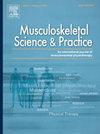Education matters when it comes to pain: a cross-sectional study of self-reported pain competencies among physiotherapists
IF 2.2
3区 医学
Q1 REHABILITATION
引用次数: 0
Abstract
The increasing burden of chronic pain raises demands for improved competencies for physiotherapists. Research suggests that postgraduate training and improved prelicensure pain curriculum might enhance physiotherapists skills in the management of people with chronic pain. The aim of this cross-sectional study was to determine self-reported pain competences among physiotherapists, and to look for potential impact of experience and education. Competencies were evaluated using an online questionnaire based on The European Diploma in Pain Physiotherapy curriculum (EDPP) using the approach of Bloom's taxonomy. Questions reflected all sections of the curriculum for the EDPP. Total score of the EDPP-questionnaire was used as the primary outcome. Responses were grouped by years of professional experience (<2, 2–7, >7 years) and level of education (entry-level, professional courses, MSc-level or higher). The validity of the hypothesis was analyzed using a two-factor ANOVA. 369 physiotherapists were eligible for analysis. A large main effect of education was found, ω2 = 0.149 (95 % CI: 0.085–0.215), p < 0.001. Additionally, a small, but significant main effect of experience was found as well, ω2 = 0.018 (95 % CI: 0.00–0.050), p = 0.008. We conclude that physiotherapists with post-graduate education are more likely to report higher levels of pain competencies, independently of how long they have worked as physiotherapists. We speculate that this may relate to their scholarly achievements, e.g., critical thinking skills, rather than more pain education alone.
当涉及到疼痛时,教育很重要:物理治疗师自我报告的疼痛能力的横断面研究
慢性疼痛的负担日益增加,提高了对物理治疗师能力的要求。研究表明,研究生培训和改进的执照前疼痛课程可能会提高物理治疗师在管理慢性疼痛患者方面的技能。本横断面研究的目的是确定物理治疗师自我报告的疼痛能力,并寻找经验和教育的潜在影响。使用基于欧洲疼痛物理治疗文凭课程(EDPP)的在线问卷,使用Bloom分类法对能力进行评估。问题反映了EDPP课程的所有部分。edpp问卷总分作为主要观察指标。回答按专业经验(2年、2 - 7年、7年)和教育水平(入门级、专业课程、硕士或更高)进行分组。采用双因素方差分析分析假设的有效性。369名物理治疗师符合分析条件。教育程度的主效应较大,ω2 = 0.149 (95% CI: 0.085 ~ 0.215), p <;0.001. 此外,也发现了一个小的但显著的经验主效应,ω2 = 0.018 (95% CI: 0.00-0.050), p = 0.008。我们的结论是,具有研究生教育的物理治疗师更有可能报告更高水平的疼痛能力,与他们作为物理治疗师工作的时间无关。我们推测,这可能与他们的学术成就有关,例如,批判性思维技能,而不仅仅是更多的疼痛教育。
本文章由计算机程序翻译,如有差异,请以英文原文为准。
求助全文
约1分钟内获得全文
求助全文
来源期刊

Musculoskeletal Science and Practice
Health Professions-Physical Therapy, Sports Therapy and Rehabilitation
CiteScore
4.10
自引率
8.70%
发文量
152
审稿时长
48 days
期刊介绍:
Musculoskeletal Science & Practice, international journal of musculoskeletal physiotherapy, is a peer-reviewed international journal (previously Manual Therapy), publishing high quality original research, review and Masterclass articles that contribute to improving the clinical understanding of appropriate care processes for musculoskeletal disorders. The journal publishes articles that influence or add to the body of evidence on diagnostic and therapeutic processes, patient centered care, guidelines for musculoskeletal therapeutics and theoretical models that support developments in assessment, diagnosis, clinical reasoning and interventions.
 求助内容:
求助内容: 应助结果提醒方式:
应助结果提醒方式:


